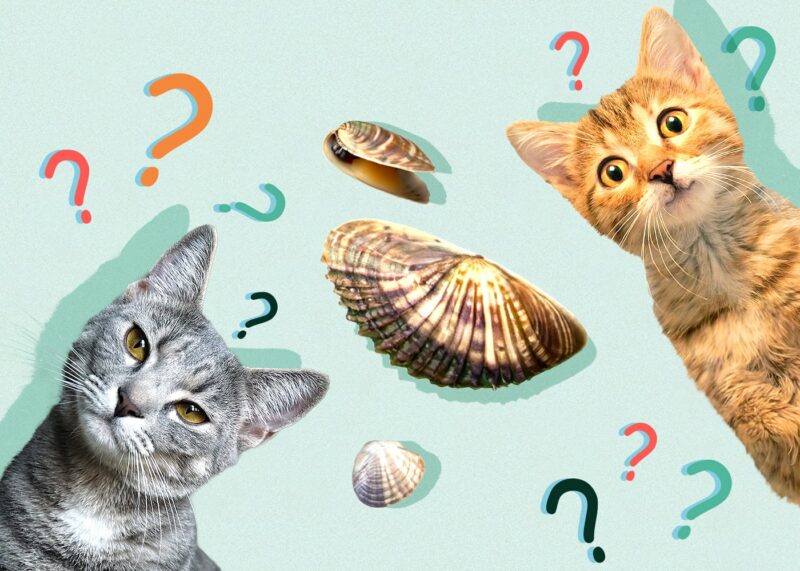Yes, cats can eat clams in moderation as long as they are properly prepared. Clams are a safe food for cats and can provide health benefits.
However, it is important to feed them in small quantities and only on a few occasions.
Can Cats Eat Clams
Yes, cats can eat clams in moderation. However, it’s important to properly prepare them and feed them in small quantities. Clams can provide some health benefits for your cat, but they should not be the primary source of their diet.
Health Benefits Of Clams For Cats
In moderation, clams can provide several health benefits for your feline friend. Here are some of the key advantages:
- High in protein: Clams are packed with protein, which is essential for cats as it aids in muscle development and growth.
- Nutrient-rich: Clams contain various vitamins and minerals beneficial for cats, such as vitamin B12, iron, zinc, and omega-3 fatty acids.
- Promotes a healthy coat: The omega-3 fatty acids present in clams can help improve the condition of your cat’s skin and coat.
- Supports immune system: The vitamins and minerals in clams can boost your cat’s immune system, helping them stay healthy and fight off diseases.
Risks And Considerations
While clams can be a nutritious addition to your cat’s diet, it’s important to be aware of the potential risks and considerations:
- Shellfish allergies: Just like humans, some cats may be allergic to shellfish. If your cat hasn’t had clams before, it’s crucial to introduce them slowly and monitor for any signs of an allergic reaction, such as vomiting, diarrhea, or skin rashes.
- Contamination risk: Raw clams can carry bacteria or parasites that may be harmful to cats. Therefore, it’s recommended to cook clams thoroughly before feeding them to your cat to reduce the risk of foodborne illnesses.
- Moderation is key: While clams offer several health benefits, they should be fed to cats in moderation. Too many clams can upset their digestive system, lead to nutrient imbalances, or cause gastrointestinal issues.
- Consult with a veterinarian: If you have any concerns or questions about feeding clams to your cat, it’s best to consult with your veterinarian. They can provide personalized advice based on your cat’s specific needs and dietary requirements.
Properly Introducing Clams To A Cat’s Diet
If you decide to incorporate clams into your cat’s diet, it’s essential to follow these guidelines:
- Start small: Begin by offering your cat a small amount of cooked, plain clams as a treat. Observe their reaction and monitor for any adverse effects.
- Monitor for allergies or sensitivity: Keep a close eye on your cat for the first few hours after they consume clams. If you notice any signs of allergies or gastrointestinal distress, discontinue feeding clams immediately and consult your veterinarian.
- Avoid seasoning: It’s important to serve clams plain, without any additives or seasonings that could be harmful to your cat.
- Balance their diet: Clams should only be a small part of your cat’s overall diet. Ensure they are receiving a balanced diet that includes other sources of essential nutrients.
In conclusion, while clams can be a safe and nutritious treat for cats, it’s crucial to feed them in moderation and properly prepare them. Always prioritize your cat’s health and consult with a veterinarian if you have any concerns.

Credit: kritterkommunity.com

Credit: www.catster.com
Frequently Asked Questions On Can Cats Eat Clams
Can Cats Have Baby Clams?
Yes, cats can have baby clams in moderation as long as they are properly prepared.
What Seafood Can Cats Not Eat?
Cats should not eat raw fish, such as clams, as they can be contaminated and pose health risks. Cooked clams, on the other hand, are safe for cats to enjoy in moderation.
Is Shellfish Toxic To Cats?
Yes, clams are safe for cats to eat in moderation as long as they are properly cooked without any additives. However, raw clams may contain bacteria and parasites that can be harmful to cats.
Can A Cat Eat Mussels?
Yes, cats can eat mussels, but they should not be the only source of food. Mussels lack some essential nutrients and are too low in fat to be a primary fat source for cats. It’s best to feed them in moderation alongside a balanced diet.
Conclusion
Cats can safely eat clams as long as they are prepared properly and given in moderation. Clams can provide some health benefits for cats, but they should not be a staple in their diet. It’s important to ensure that the clams are cooked without any additives and offered to cats in small quantities.
Remember to always consult with your veterinarian before introducing any new food to your cat’s diet.

